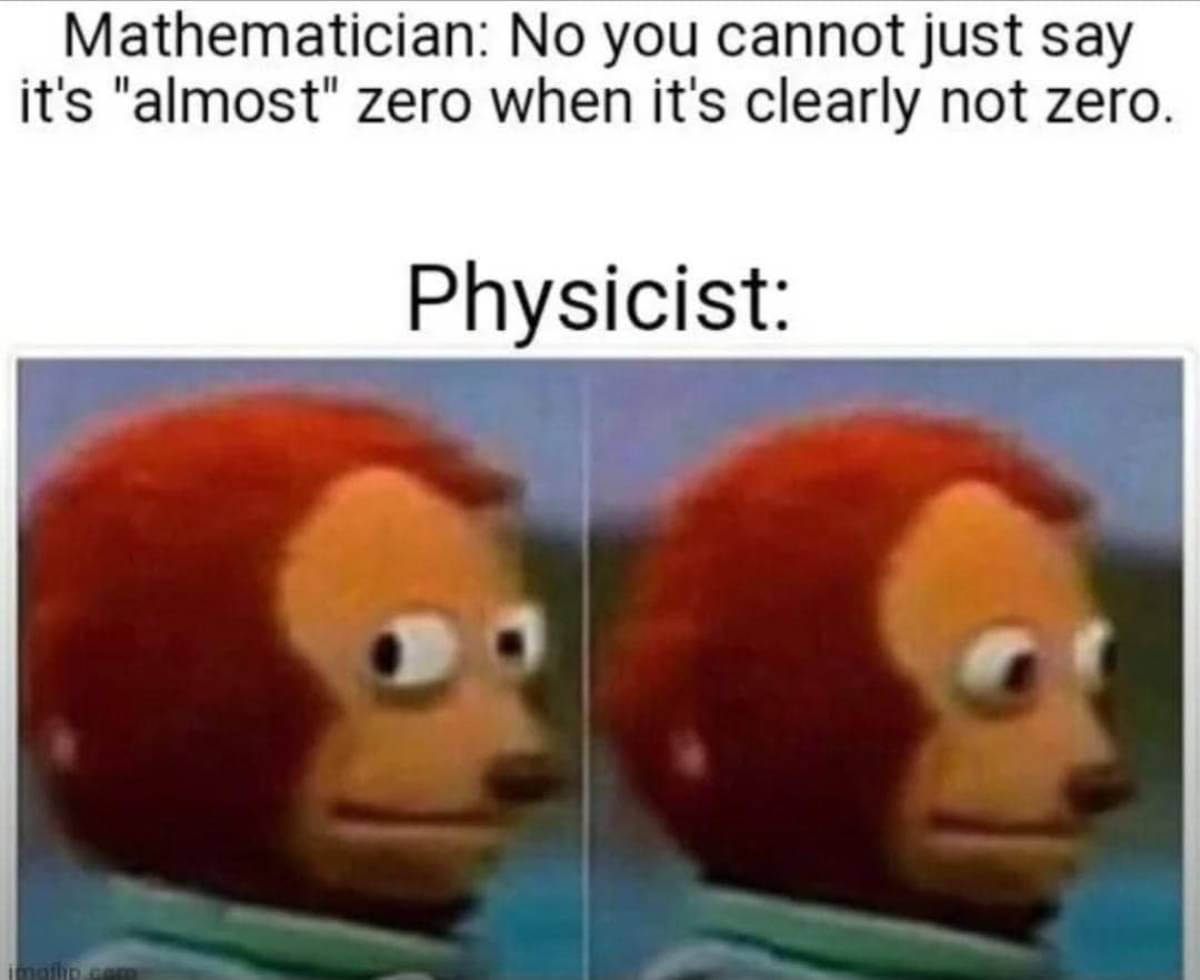this post was submitted on 18 May 2024
737 points (98.0% liked)
Science Memes
10905 readers
1416 users here now
Welcome to c/science_memes @ Mander.xyz!
A place for majestic STEMLORD peacocking, as well as memes about the realities of working in a lab.

Rules
- Don't throw mud. Behave like an intellectual and remember the human.
- Keep it rooted (on topic).
- No spam.
- Infographics welcome, get schooled.
This is a science community. We use the Dawkins definition of meme.
Research Committee
Other Mander Communities
Science and Research
Biology and Life Sciences
- [email protected]
- [email protected]
- [email protected]
- [email protected]
- [email protected]
- [email protected]
- [email protected]
- [email protected]
- [email protected]
- [email protected]
- [email protected]
- [email protected]
- [email protected]
- [email protected]
- [email protected]
- [email protected]
- [email protected]
- [email protected]
- [email protected]
- [email protected]
- [email protected]
- [email protected]
- [email protected]
- [email protected]
- !reptiles and [email protected]
Physical Sciences
- [email protected]
- [email protected]
- [email protected]
- [email protected]
- [email protected]
- [email protected]
- [email protected]
- [email protected]
- [email protected]
Humanities and Social Sciences
Practical and Applied Sciences
- !exercise-and [email protected]
- [email protected]
- !self [email protected]
- [email protected]
- [email protected]
- [email protected]
Memes
Miscellaneous
founded 2 years ago
MODERATORS
you are viewing a single comment's thread
view the rest of the comments
view the rest of the comments

What algebra uses negative 0?
Math is more than just the set of all algebras.
I'm aware. Algebra is what I'm most interested in, and so when someone says "0" I think "additive identity of a ring" unless context makes the use obvious.
Edit: I've given it some thought, and I'm not convinced all algebras can fit in a set, because every non-empty set can have at least one algebra imposed upon them, and so the set of all algebras must have cardinality no less than the proper class of all sets. We also can't have a set of all algebras (up to isomorphism) because iirc the surreal numbers are an algebra imposed on a structure that itself incorporates a proper class, and is thus incapable of being a set element.
Depends, I'd say. Is your set theory incomplete or inconsistent?
IEEE 754
I mean it's an algebra, isn't it? And it definitely was mathematicians who came up with the thing. In the same way that artists didn't come up with the CGI colour palette.
I'm not familiar with IEEE 754.
Edit: I think this sort of space shouldn't be the kind where people get downvoted for admitting ignorance honestly, but maybe that's just me.
You probably are familiar with the thing, just not under that name, and not as a subject of mathematical study. I am aware that there are, at least in theory, mathematicians never expanding beyond pen+paper (and that's fine) but TBH they're getting kinda rare. The last time you fired up Julia you probably used them, R, possibly, Coq, it'd actually be a surprise.
They're most widely known to trip up newbie programmers, causing excessive bug hunts and then a proud bug report stating "0.1 + 0.2 /= 0.3, that's wrong", to which the reply will be "nope, that's exactly as the spec says". The solution, to people who aren't numerologists, is to sprinkle gratuitous amounts of epsilons everywhere.
IEEE 754 is the standard to which basically all computer systems implement floating point numbers. It specifically distinguishes between +0 and -0 among other weird quirks.
It's a wonderful world where 1 / 0 is ∞ and 1 / -0 is -∞, making a lot of high school teachers very very mad. OTOH it's also a very strange world where x = y does not imply 1 / x = 1 / y. But it is, very emphatically, an algebra.
Mostly it's pure numerology, at least from the POV of most of the people using it.
I'll need to look at it more; it sounds interesting.
When taking about limits, you can approach 0 from the positive or negative direction, which can give very different results. For example, lim cotx, x->0+ = ∞ while lim cotx, x->0- = -∞
Speaking as a mathematician, it's not really accurate to call that -0.
You also can't call something infinity. People call stuff names. It is just important that they define their terms well enough.
Why do you think that?
Yes, but it is infinitesimally close.